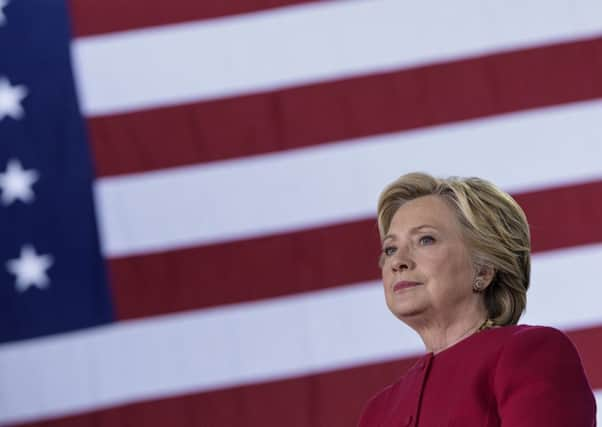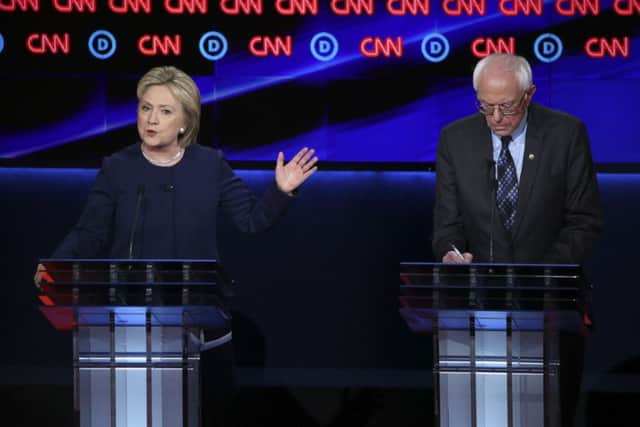Insight: Can Clinton win over the US


Among Americans the Democratic candidate has a 56 per cent unfavourability rating, which is only topped by her Republican rival, Donald Trump, on 63 per cent.
Should she win, Clinton will have no honeymoon and no grace period of the kind presidents are normally afforded. Taking into account third party candidates, she probably will not even win the popular vote – the 50 per cent that would give her a mandate.
Advertisement
Hide AdAdvertisement
Hide AdBecoming the Leader of the Free World under such circumstances means that Clinton will have an exceptionally hard time unifying the nation after one of the most bitter campaigns in history. Experts, commentators and analysts that Scotland on Sunday has spoken to all have a similar reaction when asked how she could achieve this – a sharp intake of breath followed by a long exhalation.


But that is exactly what Clinton vowed to do in her speech accepting the Democratic party’s nomination. She said that America was “stronger together”, a campaign slogan which is the title of the book of policy she co-wrote with her vice presidential running mate, Tim Kaine.
The challenge before her is enormous.
Across America a series of high-profile police killings of African Americans has led to the worst racial tensions since the Los Angeles riots in 1992.
Economic inequality is at levels not seen since 1928, before the Great Depression, and Congress nearly shut down this year when it was unable to reach a deal on the national debt.


At the same time President Barack Obama has outraged Republicans by using 235 executive orders to bypass the gridlock.
According to the nonpartisan Pew Research Centre, for the first time since its surveys began voters for both parties express not just unfavourable but “very unfavourable” views of the other side. Worse still, 45 per cent of Republicans now view Democratic policies as a “threat”, up from 37 per cent in 2014. Some 41 per cent of Democrats say the same about the Republican Party’s policies, an increase of 10 per cent on two years ago.
According to Pew, the last time things were this bad was during the Civil War, meaning that America is more divided than during Vietnam and segregation.
The experts agree that the first place Clinton must begin to address the political malaise is on Capitol Hill itself.


Advertisement
Hide AdAdvertisement
Hide AdShe will lean on her experience of serving as a senator from New York for eight years; Obama was a senator for just two years before he became president.
Clinton’s connections on The Hill will serve her well, especially people like Democratic senator Chuck Schumer, who could be the Senate majority leader next year. She will need all the help she can get, probably facing a divided Congress with Republicans in charge of the House of Representatives and Democrats in charge of the Senate.
Republican strategist Matt Mackowiak said that Clinton can breach the divide if she can “truly reach out to Republicans, not with lip service but with sincerity”.
“She has to build up trust with congressional leaders. President Obama has been woefully poor at developing relationships on Capitol Hill and scoffed at the notion that the legislature writes the laws and the executive branch signs them,” said Mackowiak.


“Hillary is a little different. She was a senator who worked in a bipartisan way when she was there on national defence and national security.”
Areas on which Clinton could work constructively with the Republicans include criminal justice reform, cyber security, fiscal responsibility and possibly even immigration.
Mackowiak said: ‘I think there’s a difference between the way the public views her and how she is viewed on Capitol Hill. There’s going to be Republicans who don’t want her to win a second term but that doesn’t mean they can’t work with her.”
Another good option for Clinton would be to put some well-known Republicans in high level positions like secretary of defense and secretary of state. Obama only put a Republican in as transport secretary, a far more junior role. According to Mackowiak, the president has “poisoned the well” in Congress by using so many executive actions. Republicans on The Hill will tell Clinton: “You can work with us, or use executive actions and we will shut it down.”
Advertisement
Hide AdAdvertisement
Hide Ad“Hillary probably won’t get 50 per cent of the vote. She has to recognise that and she needs to govern with humility if she wants a fresh start,” said Mackowiak.
Professor Timothy Hagle of the University of Iowa’s politics department, suggested that Clinton take “little steps” with both Congress and the public to win trust, adding that her task will be complicated by the fact that “the right really doesn’t like her”.
Hagle said: “The right have been not liking her for 20, 25 years and it is partly because of her approach to things and how she deals with them, like calling half of Donald Trump’s supporters deplorables.
“So far she has not seemed authentic. She doesn’t have the ability that Bill Clinton did to be able to connect to people. Even if Bill Clinton was faking it, he was very, very good at it. So far Hillary Clinton has not had that skill or ability. Even if she is willing to do it she might not accomplish it.”
To try to unify America, Clinton will also face a challenge from the left wing of the Democratic party who are still sore after her bruising primary battle with Bernie Sanders.
Her pledge to reform campaign finance law, which she took from Sanders, will placate Sanders followers, though any change in legislation faces major challenges in the Republican-controlled House.
Clinton will anger her base too if she goes back on promises to oppose trade agreements. She is distrusted by Black Lives Matter protesters who do not feel that she is tough enough on police reform. And she will come under pressure to raise the federal minimum wage to $15 an hour as she backs $12 an hour.
Clinton faces walking a tightrope on all these issues; give in too much and she angers Democrats; refuse to compromise and she will face gridlock and more division from Republicans.
Advertisement
Hide AdAdvertisement
Hide AdIn an editorial in The Nation, a leading left-wing magazine, DD Guttenplan urged Clinton to get rid of the “superdelegates”, establishment party officials that helped her clinch the Democratic nomination.
“Change the rules, even though they helped you win. Symbolism matters. Getting rid of superdelegates would be a big victory for Sanders that would cost you nothing,” he said. “Listen to Bernie. Compromise when you can. And explain why when you can’t.”
Should all this fail, then Democratic strategist Jennifer Duffy suggested another approach entirely – bribery.
In 2011 Congress banned “earmarks” – the American term for ring-fencing under which money is given for specific projects – on the basis that the system had been abused for too long.
Duffy thinks it should be restored.
“One of the things Hillary wants to do early in her administration is something that relates to jobs and infrastructure. Probably the worst thing that the Senate did was get rid of earmarks – it was a way to make friends,” she said.
“If Hillary wants to build infrastructure projects then she should create some earmarks of her own. I don’t know a state in this country that would turn away infrastructure money. Earmarks were a system that worked for a very long time.”
Beyond Congress, Clinton must try to bring together a country where a large number of Republicans will pin her victory down to a rigged election.
Hagle said that Clinton should use the bully pulpit that the presidency offers to talk about issues she can’t legislate on.
Advertisement
Hide AdAdvertisement
Hide Ad“That’s often a way to keep your national mandate and appeal to your base. Obama spoke on issues like race but he politicised them. Hillary will need to go out and try to bring the country to a more civil place, to reach out to areas that are not her base and find some common ground,” he said.
Arguably the biggest challenge that Clinton faces is one which no amount of policy can resolve – her likeability.
For many voters there is a shiftiness about Clinton and her husband they just cannot stomach. The feeling is that they bend the rules as far as they will go and feel like the law does not apply to them.
The scandal over her use of a private email server when she was Secretary of State is held up by Republicans as Exhibit A in supporting evidence, closely followed by suspicions of incompetence and cover-up surrounding the 2012 terror attack on a US diplomatic compound in Benghazi, Libya.
Clinton has also faced criticism over the Clinton Foundation, her family’s charitable organisation, which has been exposed for receiving questionable donations from foreign governments and individuals.
Another issue which Clinton’s critics have seized upon is her age.
She is currently 68 and, if she wins, will be 69 on taking office, making her the second oldest person to assume the title after Ronald Reagan.
Her advanced years have been brought into focus by the video of her nearly collapsing at the 9/11 memorial service last month.
Advertisement
Hide AdAdvertisement
Hide AdClinton’s campaign initially claimed that she was dehydrated, until the video, shot by a passer by, emerged. Once again her critics claimed that she was covering up the truth.
Currently polls give Clinton at an 80 per cent chance of winning the presidential race with Trump on 20 per cent.
With such odds, the outcome normally would be considered a done deal, but in a year that has seen Brexit, Colombia rejecting a peace deal with terrorist guerrillas and Austria nearly electing its first far right government since the Second World War – it may yet do that – nothing can be ruled out.
And even if Clinton does win, the long shadow of Donald Trump will be cast over her first term.
The real estate mogul has coarsened American politics and normalised racist and sexist rhetoric which was previously off-limits to mainstream politicians – even if his lewd comments caught on videotape in 2005 prove to be his undoing.
That is perhaps the biggest challenge to Clinton when she attempts to bring America together. Before she can even try, she must drag the country out of the sewer.